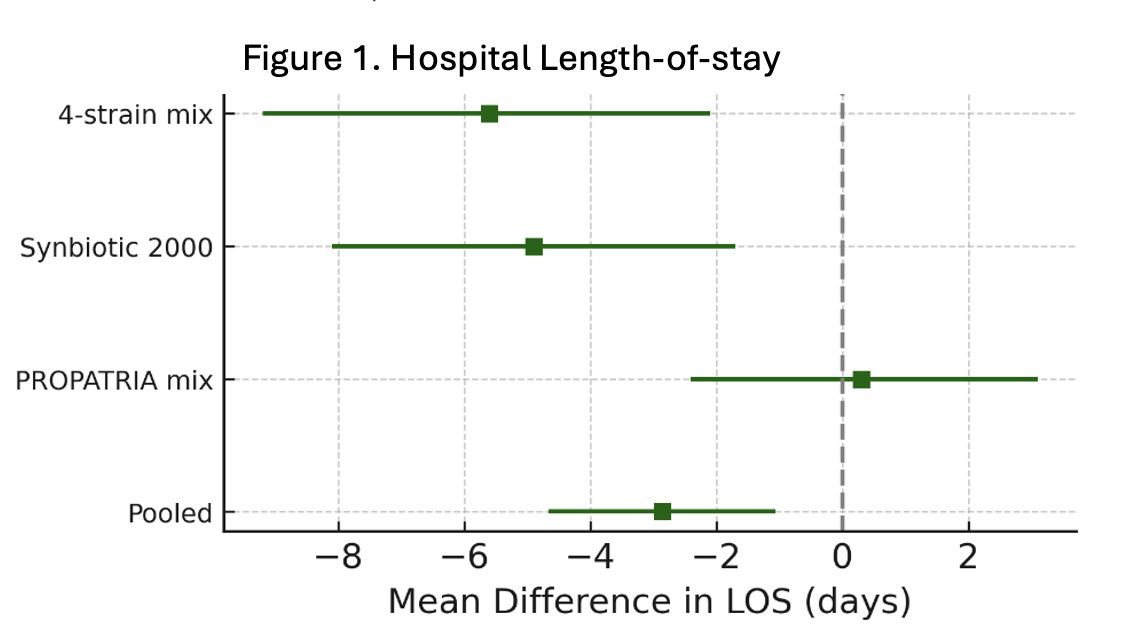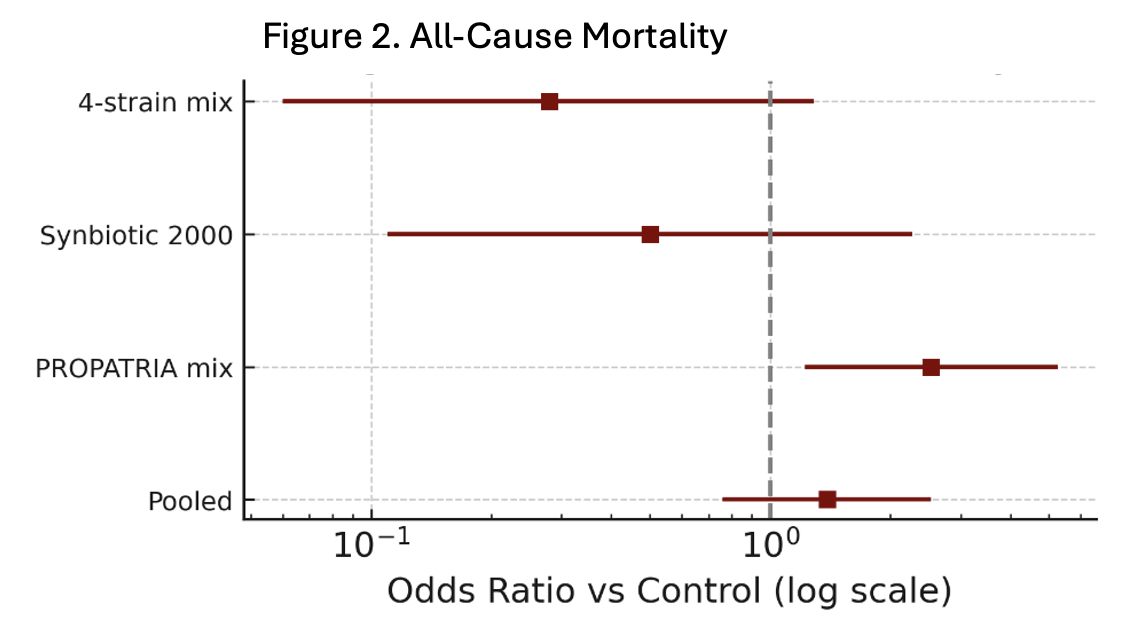Tuesday Poster Session
Category: Biliary/Pancreas
P4349 - The Efficacy and Safety of Microbiome Modulating Agents Alongside Standard Management for Acute Pancreatitis: An Updated Systematic Review and Network Meta-Analysis
Tuesday, October 28, 2025
10:30 AM - 4:00 PM PDT
Location: Exhibit Hall

Manthan Patel, MD
University of Toledo College of Medicine and Life Sciences
Toledo, OH
Presenting Author(s)
Patel Manthanbhai, MD1, Sudheer Dhoop, MD2, Hasan Al-Obaidi, MD1, Nooraldin Merza, MD1, Ali Nawras, MD3, Muhammad Ali Ibrahim Kazi, MD4
1University of Toledo College of Medicine and Life Sciences, Toledo, OH; 2University of Toledo, Toledo, OH; 3The University of Toledo, Toledo, OH; 4Anne Arundel Medical Center, Annapolis, MD
Introduction: Acute pancreatitis (AP) admissions continue to rise with gall-stone disease and alcohol use. Contemporary protocols have cut mortality and length-of-stay (LOS), yet inflation-adjusted hospital costs have doubled. Bacterial translocation across a disrupted gut barrier is the main driver of infected necrosis and sepsis, prompting interest in microbiome-modulating agents (MMAs: probiotics or synbiotics). These products are costly and not standard of care. We therefore synthesised all modern evidence to clarify whether MMAs improve clinically relevant AP outcomes.
Methods: Embase, MEDLINE, CENTRAL and Scopus were searched to 8 May 2025. Two reviewers screened and extracted data; high-risk studies (RoB-2 or Newcastle-Ottawa) were removed in sensitivity analyses. A Bayesian random-effects network meta-analysis (gemtc, R2jags 4.3.2) pooled direct and indirect evidence; node-splitting tested inconsistency and meta-regression explored severity effects. The primary endpoint was a composite of infected pancreatic necrosis and extra-pancreatic infections; secondary endpoints were all-cause mortality and LOS. Odds ratios (OR) were calculated for dichotomous and mean differences (MD) for continuous data.
Results: Nineteen studies (15 RCTs, 4 cohorts; n = 1 430, 83 % severe AP) met criteria and were included in our review (Table 1). Three probiotic/synbiotic regimens formed a connected evidence network.4-strain Chinese mix + early enteral nutrition vs control: infection OR 0.28 (0.11–0.69), I² 12 %; LOS –5.6 days (–9.2 to –2.1); mortality OR 0.28 (0.06–1.29).Synbiotic 2000: infection OR 0.41 (0.18–0.93), I² 5 %; LOS –4.9 days (–8.1 to –1.7); mortality OR 0.50 (0.11–2.27).PROPATRIA 6-strain mix: infection OR 0.96 (0.67–1.37); LOS MD +0.3 days (–2.4 to +3.1); mortality excess OR 2.53 (1.22–5.25). An indirect comparison of Synbiotic 2000 vs 4-strain mix showed no significant difference (OR 1.46 [0.55–3.86]). Global heterogeneity was low–moderate (I² ≤ 38 %); no inconsistency or severity interaction was detected.
Discussion: Modern synbiotic formulations (Synbiotic 2000 and the contemporary 4-strain Chinese mix) reduce infectious complications and shorten hospital stay in AP without increasing deaths, whereas the older PROPATRIA preparation confers no benefit and may be harmful. Benefits appear strain-specific; MMAs should not be used interchangeably. Large, multinational RCTs evaluating a single, standardised agent are warranted before routine adoption.

Figure: Figure 1B. Effect of Probiotics on Hospital Length-of-Stay. Forest plot illustrating mean difference in hospital length-of-stay (LOS) in days for each probiotic formulation compared to control. Negative values favor probiotics (shorter stay). Point estimates are shown as squares, with 95% confidence intervals as horizontal lines. A pooled estimate is included.

Figure: Figure 1C. Effect of Probiotics on All-Cause Mortality. Forest plot presenting odds ratios (log scale) for all-cause mortality across probiotic subgroups versus control. Values <1 suggest reduced mortality with probiotics. Squares represent point estimates; horizontal bars indicate 95% confidence intervals. Pooled estimate is shown at the bottom.
Disclosures:
Patel Manthanbhai indicated no relevant financial relationships.
Sudheer Dhoop indicated no relevant financial relationships.
Hasan Al-Obaidi indicated no relevant financial relationships.
Nooraldin Merza indicated no relevant financial relationships.
Ali Nawras indicated no relevant financial relationships.
Muhammad Ali Ibrahim Kazi indicated no relevant financial relationships.
Patel Manthanbhai, MD1, Sudheer Dhoop, MD2, Hasan Al-Obaidi, MD1, Nooraldin Merza, MD1, Ali Nawras, MD3, Muhammad Ali Ibrahim Kazi, MD4. P4349 - The Efficacy and Safety of Microbiome Modulating Agents Alongside Standard Management for Acute Pancreatitis: An Updated Systematic Review and Network Meta-Analysis, ACG 2025 Annual Scientific Meeting Abstracts. Phoenix, AZ: American College of Gastroenterology.
1University of Toledo College of Medicine and Life Sciences, Toledo, OH; 2University of Toledo, Toledo, OH; 3The University of Toledo, Toledo, OH; 4Anne Arundel Medical Center, Annapolis, MD
Introduction: Acute pancreatitis (AP) admissions continue to rise with gall-stone disease and alcohol use. Contemporary protocols have cut mortality and length-of-stay (LOS), yet inflation-adjusted hospital costs have doubled. Bacterial translocation across a disrupted gut barrier is the main driver of infected necrosis and sepsis, prompting interest in microbiome-modulating agents (MMAs: probiotics or synbiotics). These products are costly and not standard of care. We therefore synthesised all modern evidence to clarify whether MMAs improve clinically relevant AP outcomes.
Methods: Embase, MEDLINE, CENTRAL and Scopus were searched to 8 May 2025. Two reviewers screened and extracted data; high-risk studies (RoB-2 or Newcastle-Ottawa) were removed in sensitivity analyses. A Bayesian random-effects network meta-analysis (gemtc, R2jags 4.3.2) pooled direct and indirect evidence; node-splitting tested inconsistency and meta-regression explored severity effects. The primary endpoint was a composite of infected pancreatic necrosis and extra-pancreatic infections; secondary endpoints were all-cause mortality and LOS. Odds ratios (OR) were calculated for dichotomous and mean differences (MD) for continuous data.
Results: Nineteen studies (15 RCTs, 4 cohorts; n = 1 430, 83 % severe AP) met criteria and were included in our review (Table 1). Three probiotic/synbiotic regimens formed a connected evidence network.4-strain Chinese mix + early enteral nutrition vs control: infection OR 0.28 (0.11–0.69), I² 12 %; LOS –5.6 days (–9.2 to –2.1); mortality OR 0.28 (0.06–1.29).Synbiotic 2000: infection OR 0.41 (0.18–0.93), I² 5 %; LOS –4.9 days (–8.1 to –1.7); mortality OR 0.50 (0.11–2.27).PROPATRIA 6-strain mix: infection OR 0.96 (0.67–1.37); LOS MD +0.3 days (–2.4 to +3.1); mortality excess OR 2.53 (1.22–5.25). An indirect comparison of Synbiotic 2000 vs 4-strain mix showed no significant difference (OR 1.46 [0.55–3.86]). Global heterogeneity was low–moderate (I² ≤ 38 %); no inconsistency or severity interaction was detected.
Discussion: Modern synbiotic formulations (Synbiotic 2000 and the contemporary 4-strain Chinese mix) reduce infectious complications and shorten hospital stay in AP without increasing deaths, whereas the older PROPATRIA preparation confers no benefit and may be harmful. Benefits appear strain-specific; MMAs should not be used interchangeably. Large, multinational RCTs evaluating a single, standardised agent are warranted before routine adoption.

Figure: Figure 1B. Effect of Probiotics on Hospital Length-of-Stay. Forest plot illustrating mean difference in hospital length-of-stay (LOS) in days for each probiotic formulation compared to control. Negative values favor probiotics (shorter stay). Point estimates are shown as squares, with 95% confidence intervals as horizontal lines. A pooled estimate is included.

Figure: Figure 1C. Effect of Probiotics on All-Cause Mortality. Forest plot presenting odds ratios (log scale) for all-cause mortality across probiotic subgroups versus control. Values <1 suggest reduced mortality with probiotics. Squares represent point estimates; horizontal bars indicate 95% confidence intervals. Pooled estimate is shown at the bottom.
Disclosures:
Patel Manthanbhai indicated no relevant financial relationships.
Sudheer Dhoop indicated no relevant financial relationships.
Hasan Al-Obaidi indicated no relevant financial relationships.
Nooraldin Merza indicated no relevant financial relationships.
Ali Nawras indicated no relevant financial relationships.
Muhammad Ali Ibrahim Kazi indicated no relevant financial relationships.
Patel Manthanbhai, MD1, Sudheer Dhoop, MD2, Hasan Al-Obaidi, MD1, Nooraldin Merza, MD1, Ali Nawras, MD3, Muhammad Ali Ibrahim Kazi, MD4. P4349 - The Efficacy and Safety of Microbiome Modulating Agents Alongside Standard Management for Acute Pancreatitis: An Updated Systematic Review and Network Meta-Analysis, ACG 2025 Annual Scientific Meeting Abstracts. Phoenix, AZ: American College of Gastroenterology.
